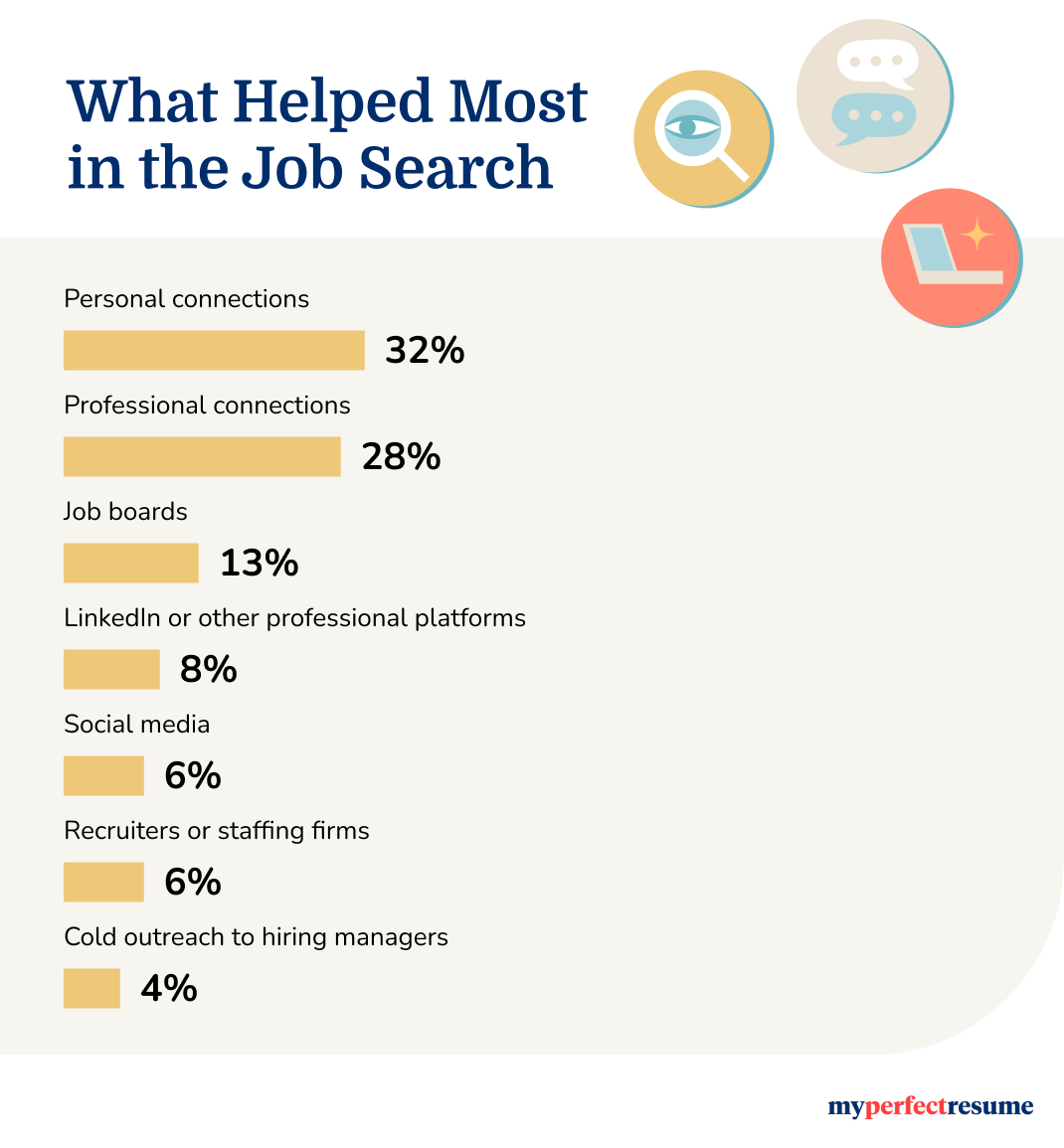Our customers have been hired at: *Foot Note
Table of Contents
Get started with MyPerfectResume today!
- Build a resume on any device
- Pick an ATS-friendly template
- Tailor with AI copy suggestions
In today’s world of job boards, algorithms, and AI-driven applications, one old-school strategy still reigns supreme: human connection. More than half of workers say they’ve landed a job through a personal or professional connection, making it the top-ranked tool in the job search process.
And yet, most job seekers rarely tap into this resource. Only 1 in 10 reaches out to multiple contacts each week during their search. Why the disconnect? This report examines the tension between the effectiveness of networking and the discomfort many job seekers experience when engaging in it.
Despite being named the most helpful resource in job searching—outranking job boards, recruiters, and staffing firms—networking remains underused. Based on a May 2025 survey of 1,000 U.S. workers, the Networking Nation Report reveals that lack of confidence, discomfort with asking, and limited outreach continue to hold workers back.
Key Findings
- Connections outperform everything else. When including referrals, connections dominated job hunting success, with 32% of workers crediting personal connections and 28% pointing to professional connections as the most helpful job search strategy they used. That’s far ahead of job boards (13%) and staffing firms (8%).
- Referrals are effective, but they’re underutilized. 54% of workers report landing a job through a connection, yet more than 1 in 5 (21%) have never asked anyone for a referral.
- Most job seekers keep their job search private. Nearly 60% of workers say they reach out to only a few close contacts or no one at all when looking for a new job.
- Regular networking is rare. Just 1 in 10 workers reach out to multiple contacts each week during a job search, despite strong evidence that networking helps land jobs.
- Confidence is the most significant barrier. 34% cite lack of confidence as the top reason they don’t network more.
From who gets asked for referrals to what workers want from their networks, here’s what the data tells us about job search behavior and trends, and what you can do about it.
Connections Outperform All Other Job Search Tools
The data shows that connections are by far the most helpful tool when looking for work:
- Personal connections (32%)
- Professional connections (28%)
- Job boards (13%)
- LinkedIn or other professional platforms (8%)
- Social media (6%)
- Recruiters or staffing firms (6%)
- Cold outreach to hiring managers (4%)
Here is a visual representation of the data from above:
Why it matters: Connections remain the most effective way to land a job, yet job seekers continue to underestimate their importance or avoid this strategy altogether in favor of less effective tools.
Job Seekers Are Keeping Quiet
When it comes to looking for work, many employees keep their search close to their chest:
- Only reach out a few times during the job search (30%)
- Only tell one or two close contacts (29%)
- Never reach out (20%)
- Don’t tell anyone (10%)
- Reach out to multiple contacts weekly (10%)
That means nearly 60% of workers engage minimally or not at all with their network during a job search. Networking is the most effective tool in the job search toolbox, but it is also one of the most emotionally complicated.
These results show an apparent mismatch between what works and what workers feel comfortable doing. The good news is that you don’t need a massive network. You just need to build trust and ask.
Why it matters: Staying silent during a job search not only limits opportunity but also adds unnecessary pressure. Strategic networking for your job search could accelerate job outcomes with less stress.
Who Gets Asked for Referrals?
Workers most often turn to:
- Friends (28%)
- Colleagues (18%)
- Parents (8%)
- Other family members (10%)
- Mentors or sponsors (9%)
- Networking contacts (6%)
Yet 21% of respondents said they’ve never asked anyone for a referral. With recent recruiting trends indicating a rise in job listings that have already been filled, job seekers who do not leverage their network and rely solely on job boards may miss out on key opportunities.
Why it matters: Many job seekers are missing out on their best opportunities by not tapping into close and professional contacts who are already willing to help.
Who Gives Referrals—and Why
Most people give referrals, but only if they trust the person:
- Only refer if they trust the person (67%)
- Refer regardless (18%)
- Never refer (15%)
Why do people agree to refer someone?
- Direct experience and trust in skills (32%)
- Strong belief in potential (21%)
- General willingness to help their network (17%)
- Expectation of future reciprocity (9%)
- Personal/professional obligation (7%)
- Desire to help even if uncertain (7%)
- Avoid referrals altogether (8%)
Why it matters: Trust drives referrals. Building credibility with even a few trusted contacts can unlock powerful job opportunities.
What Workers Want From Their Networks
When asked what they’d like to improve in their personal and professional networks, workers prioritized:
- Stronger relationships (25%)
- More contacts (16%)
- More job search support (12%)
- Better mentorship (11%)
- More frequent interaction (11%)
- Greater access to decision-makers (10%)
- Industry diversity (6%)
- Geographic range (5%)
- Inclusion/accessibility (4%)
Why it matters: Workers know their networks matter, but they don’t always feel equipped to nurture or expand them. Empowering people with the tools to build meaningful and diverse relationships is key to achieving long-term career success.
Networking doesn’t have to mean schmoozing at awkward mixers or messaging strangers on LinkedIn. At its core, it’s about showing up for your people—and letting them show up for you.
Whether you’re actively job hunting or just thinking ahead, your next opportunity might already be one conversation away. Start with trust. Start small. But whatever you do, don’t wait until you need a job to start connecting.
For press inquiries, contact Nathan Barber at nathan.barber@bold.com.
Survey Methodology
The findings presented in this report are based on a nationally representative survey conducted by MyPerfectResume using Pollfish on May 2, 2025. The survey collected responses from 1,000 U.S. adults who are currently employed. It explored their experiences with job referrals, comfort levels with networking, and the role of personal and professional connections in the job search process.
Respondents answered a mix of yes/no, single-selection, and multiple-choice questions covering topics such as referral behavior, barriers to networking, and decision-making processes surrounding the recommendation of others for roles. Participants represented a broad cross-section of the working population, encompassing a diverse range of genders, ages, and educational backgrounds. The sample included 51% male respondents (508), 49% female respondents (489), and less than 1% who preferred not to answer (3).
Age-wise, respondents were distributed across generational cohorts: 12% were aged 18–24, 18% were 25–34, 19% were 35–44, 14% were 45–54, 19% were 55–64, and 19% were 65 or older. In terms of educational attainment, 17% held graduate degrees, 27% held a bachelor’s degree, 15% had an associate degree, 38% had a high school diploma or equivalent, and 3% had less than a high school education.
All participants were screened to ensure they were currently residing in the U.S. and actively employed at the time of the survey. The data collection adhered to Pollfish’s quality control standards to ensure the accuracy and reliability of the results.
About MyPerfectResume
MyPerfectResume Resume Builder with professional templates is designed to help job seekers elevate their careers. The easy-to-use platform was created to eliminate the hassle of resume writing, offering professionally written examples, free expert tips, step-by-step guidance to make a resume, and valuable interview advice to create an outstanding job application effortlessly. Since 2012, MyPerfectResume's Resume Builder has helped more than 11 million job seekers create their perfect resumes online. Its comprehensive employment surveys have been featured in Forbes, Yahoo! Finance, CNBC, Newsweek, USA Today, BBC, Workable, and more. Stay connected with MyPerfectResume’s latest Facebook, LinkedIn, Instagram, X, and Pinterest updates.
Our customers have been hired at:*Foot Note











